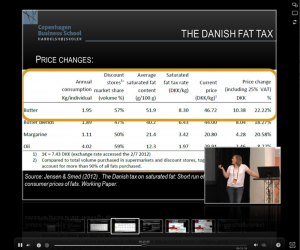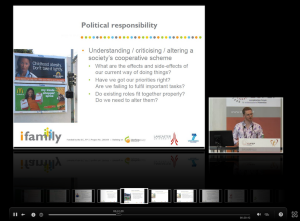I Family presents at the European Forum for Evidence-based Health Promotion and Prevention
 On June 12-13 2013, three I Family researchers gave presentations at the European Forum for Evidence-based Health Promotion and Prevention, in Krems, Austria. The theme of the conference was obesity prevention, and all the talks are available on-line:
On June 12-13 2013, three I Family researchers gave presentations at the European Forum for Evidence-based Health Promotion and Prevention, in Krems, Austria. The theme of the conference was obesity prevention, and all the talks are available on-line:
• Wolfgang Ahrens, Coordinator of I Family and its predecessor study IDEFICS, discussed the results that have so far emerged from the consortium’s research, under the title ‘IDEFICS: the effects of nutrition and lifestyle on children’s obesity risk’. (German, with English slides)
• Wencke Gwozdz’s talk was titled, ‘Effectiveness of food and beverage taxes in general and the current example of the Danish food tax on saturated fat’. Food and beverage taxation is regarded as one promising structural policy-instrument that aims to enhance healthy lifestyles and decrease negative impacts on climate and environment. The Danish fat tax has been designed to reduce pressure of income taxation and to help consumers to comply with recommended nutritional guidelines regarding amounts of fat. The Danish fat tax had been – as the first of its kind in Europe – introduced in October 2011, but has already been abolished since January 2013. The implementation of the tax raised some concerns among food industry, policy-makers and some consumer organizations. Concerns included the unclear definition of the tax, increased cross-border trade, lowered profits for Danish food manufacturers, administrative burdens as well as regressive effects on lower socio-economic status households. But despite the short life of the fat tax, first studies indicate effects on consumers’ purchase and consumption behaviour: for example, within the first three months of the fat tax, consumption of fats decreased by 10-20%. The abundance of the fat tax fuels opponents within and outside Denmark, despite benefits and adverse effects of such a food and beverage tax can never be evaluated after 15 months of life.
administrative burdens as well as regressive effects on lower socio-economic status households. But despite the short life of the fat tax, first studies indicate effects on consumers’ purchase and consumption behaviour: for example, within the first three months of the fat tax, consumption of fats decreased by 10-20%. The abundance of the fat tax fuels opponents within and outside Denmark, despite benefits and adverse effects of such a food and beverage tax can never be evaluated after 15 months of life.
• In his talk, ‘Obesity prevention: Dividing responsibilities for action’, Garrath Williams (Lancaster University, UK) tackled some general difficulties in dividing and sharing responsibilities to address complex social problems. He highlighted a series of reasons why it is so difficult to address a problem like obesity prevention. Since obesity is, in part, a side-effect of otherwise desirable social changes, addressing it is likely to involve sacrifices or tradeoffs. This also requires us to reimagine how our societies are organised, and despite our best efforts to gather evidence, we cannot be certain in advance what the costs and benefits will be. Not least, it requires us to constrain the power of the food and drink industries: since companies have a legal duty to pursue profitability, sensible regulation will be needed to make their activities less liable to generate obesity. But his talk also pointed to some reasons for optimism. First, it has been relatively easy to secure acceptance that obesity prevention should have a greater priority – partly (and unfortunately) because of social prejudice against fat. Second, many societal changes that might address obesity might also serve existing or emerging priorities – from children’s independence to sustainability or improved food cultures.
But his talk also pointed to some reasons for optimism. First, it has been relatively easy to secure acceptance that obesity prevention should have a greater priority – partly (and unfortunately) because of social prejudice against fat. Second, many societal changes that might address obesity might also serve existing or emerging priorities – from children’s independence to sustainability or improved food cultures.
All other presenters’ talks can also be viewed on the EUFEP Website.







